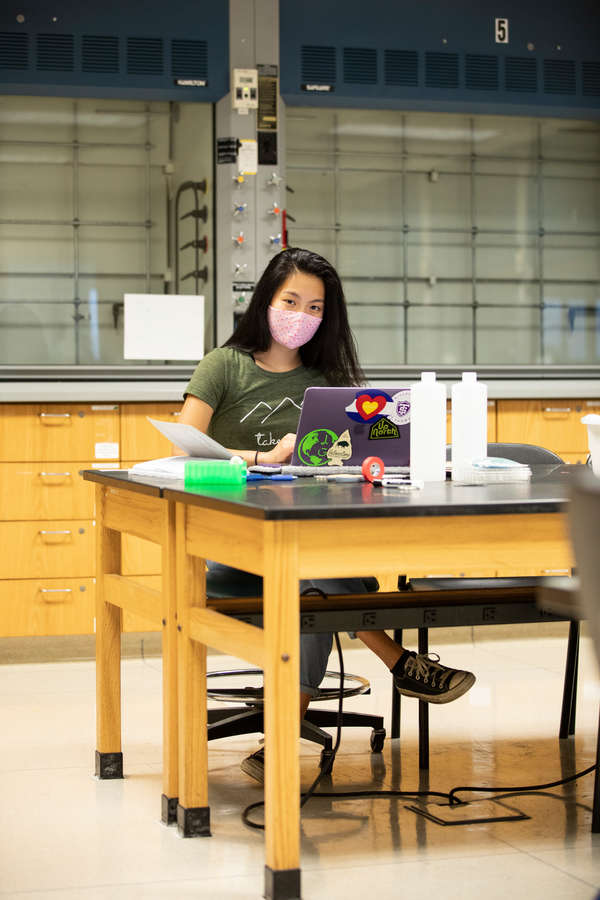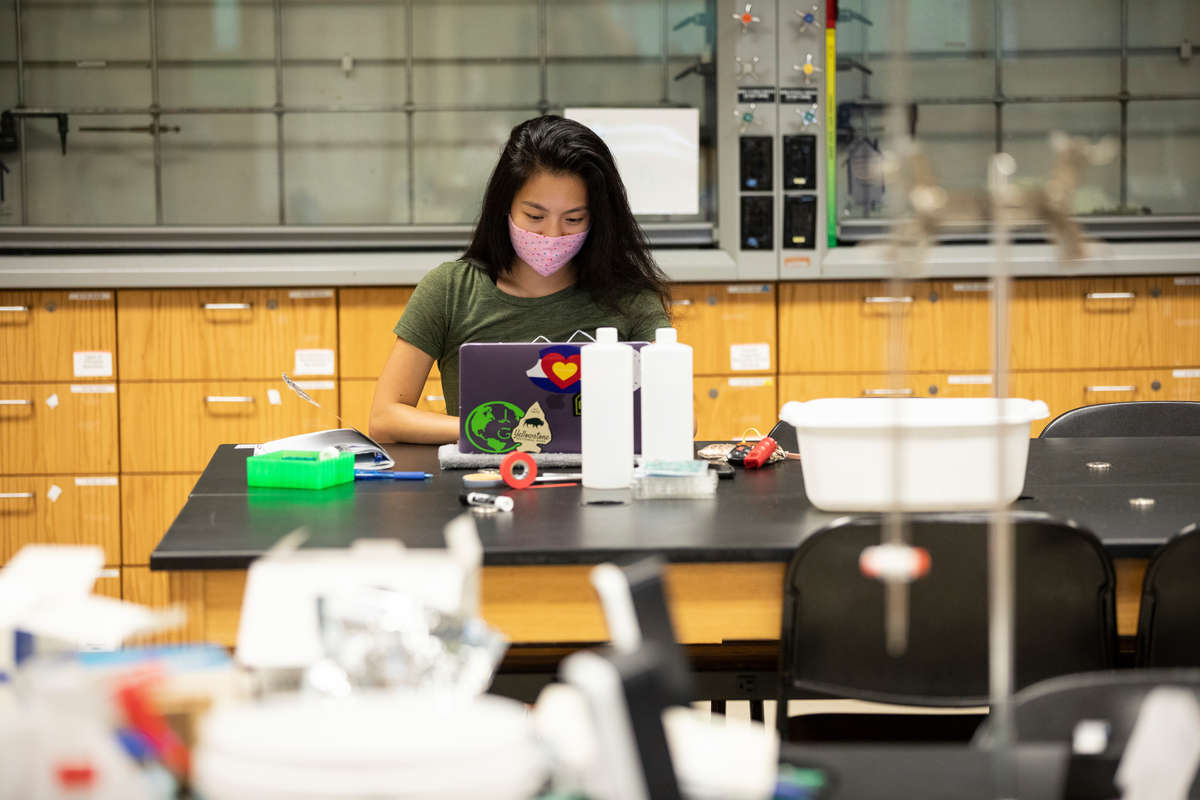More than 70 St. Thomas undergraduate students spent their summer doing research on a diverse range of subjects through St. Thomas' Undergraduate Research Opportunities Program.
The program provides grant funding to students making them paid professionals for their work and research. This year, 51 Young Scholars, five Sustainability Scholars, 14 Ignite Research Scholars and one Community-Based Researcher representing two dozen majors dug into a variety of topics in their respective fields.
Ignite Research Scholars is a new program giving students an early option to get started and explore research. These scholars gain experience by working as summer research assistants on projects designed by faculty.
The Newsroom caught up with student scholars to find out more about what they studied, what it’s like to work with a faculty mentor and how their research benefits their academic careers.
Name: Victoria Welter
Year: Junior
Major: English with creative writing emphasis
Research Title: "Historical Novel with Feminist Themes"
Faculty Mentor: Elizabeth Wilkinson, English
Grant: Young Scholars
Describe what you’re researching this summer.
I am conducting research and writing a novel simultaneously. The novel is set in the 1950s Midwest during the polio epidemic. I spend half of my days researching relevant subjects such as polio as a disease and what contracting polio looked like for an 8-year-old girl in 1952, the culture of the 1950s, women's baseball teams in the '50s (I have a character, a girl, that loves baseball) and whatever information I need for the book. The other half of my day I spend writing, drafting and crafting the story.
What is the most interesting thing you’ve found so far in your research?
One reason I wanted to write about a girl with polio is because my aunt Carol had polio. When I was a child, my mom took care of my aunt in an iron lung (a breathing machine that helped polio patients) every day and I tagged along. Although Carol died when I was six, we were very close, but we never talked much about her time in the hospital or her recovery process.
Over the course of my research I've stumbled upon a few things about Carol. For example, while looking up the Sister Kenny Institute in Minneapolis (a hospital for polio patients), I found an article about my aunt! No one in my family remembered or knew of it either, so it was fun to share it with them. Recently, another aunt of mine passed in January and we've been going through her things, where I have found fascinating pieces of Carol's history but also polio. We found her leg brace, pictures of her and her friends at the Sister Kenny Institute, letters she wrote with her mouth to her mother, and more. I not only learned about my aunt, but also what life as a polio victim looked like.
What has been the most valuable part of having funded research be part of your undergraduate experience at St. Thomas?
I am so grateful for this opportunity from St. Thomas. This grant has given me the opportunity to take what I've learned in my creative writing classes and apply it to my writing on a larger scale. In class, we write shorter pieces, but this grant has allowed me the time, space and funds to write and research a novel. Becoming a professional author is not an easy task, however, I feel like I have a head start now that I've completed a draft of a novel as an undergrad. I believe this grant will be the highlight of my career at the University of St. Thomas.
What have been the biggest benefits of working with an academic adviser like you have this summer?
Working with Dr. Liz Wilkinson has been a wonderful experience. Having an adviser helps keep me motivated and she gives me guidance when I need it. Each week, Dr. Wilkinson and I meet over Zoom to discuss how the writing and research is going. We also spend about an hour writing together. There is something magical about writing with another person, even though we are working on very different projects. We also read each other's work and give one another feedback. Having Dr. Wilkinson's support made the project smoother and overall a more pleasant experience.

Cassandra Martin
Name: Cassandra Martin
Year: Junior
Major: Chemistry
Research Title: "Degradation Products of Perfluorinated Compounds Measured Using Precursor Ion MS"
Faculty Mentors: Anthony Borgerding, Chemistry
Grant: Young Scholars
Describe what you’re researching this summer.
This summer, I have been studying perfluorinated compounds which are made of a carbon chain of varying lengths, carbon-fluorine bonds instead of carbon-hydrogen bonds, and a functional group bonded at the end. These compounds are of concern because they are persistent pollutants that end up in our bodies mainly through the food and water we consume. With water samples from the local banks of the Mississippi, I can extract and analyze what and how much of the PFCs are present. I am researching the products of when they break down via precursor ion mass spectrometer (MS) and looking for any unknown products.
What is the most interesting thing you’ve found so far in your research?
I think the most interesting things I have found so far are how to extract analytes using solid phase extraction and how to use and troubleshoot the mass spectrometer.
What has been the most valuable part of having funded research be part of your undergraduate experience at St. Thomas?
Learning useful analytical chemistry procedures to explore an interesting topic while being surrounded by great people.
What have been the biggest benefits of working with an academic adviser like you have this summer?
The greatest benefit of getting to work with Dr. Borgerding is learning how to perform SPE (solid phase extraction) and use the MS while receiving guidance from him. Research has given me the opportunity to work and learn from him in a more individualized setting.
Name: Giang Nguyen
Year: Sophomore
Major: Finance management
Research Subject: Discrimination in the rental housing market in the Twin Cities
Faculty Mentor: Deborah Rho, Economics
Grant: Ignite Research Scholars
Describe what you’re researching this summer.
My research team is conducting an experiment in which we send email inquiries to real landlords (who post vacancies for their rental units online) using fictitious applicants. We will examine whether landlords’ response rates differ by the perceived race of the potential tenants and other characteristics of the inquiry. The perceived race (white, African American and Somali American) is experimentally manipulated through the names of the potential tenants. Differences in response rates across perceived race from landlords can be interpreted as discrimination as all other aspects of the email inquiry will be randomized.
What is the most interesting thing you’ve found so far in your research?
The "Ban the Box" law – an ordinance that bars landlords from denying applications based on convictions of felonies that are older than seven years, potentially increases discrimination against certain minority groups.
What has been the most valuable part of having funded research be part of your undergraduate experience at St. Thomas?
As I have long been intrigued by social science, I think there are no better opportunities for me to build on my academic career and enrich my knowledge than this funded research. I am so grateful for the chance to broaden my horizons while learning more about my interests and career.
What have been the biggest benefits of working with an academic adviser like you have this summer?
This project offers real-life exposure to research, which will help me navigate my future career. Moreover, this is an ideal occasion for me to develop my professional network, make acquaintances and establish relationships.
Name: Mohamud Abdimuhsin
Year: Sophomore
Major: Civil engineering
Research Title: "RCA Low Replacement Level"
Faculty Mentors: Rita Lederle, Engineering
Grant: Young Scholars
Describe what you are researching this summer.
Recycled concrete aggregate (RCA) has been extensively researched as a way to improve the sustainability of concrete, eliminate construction waste and address looming shortages of virgin coarse aggregates. However, the goal of most research is to investigate high replacement levels and maximize the amount of RCA in the concrete. In reality, many agencies do not have access to enough RCA to use high replacement levels because RCA is in high demand for other applications, such as granular bases. Additionally, many agencies are reluctant to explore high replacement levels because of known concerns with the use of high replacement levels of RCA.
The goal of this research is to investigate the effect low and moderate replacement levels of coarse RCA for virgin coarse aggregate in concrete for paving applications. Low and moderate replacement levels are most likely to be implemented because they do not require as much RCA and they may be perceived to have less risk to owners. Therefore, it is important to understand how these replacement levels will affect the mechanical and nonmechanical properties of the concrete. This research will investigate the effect of up to three different RCA coarse aggregate types at various low and moderate replacement levels (10% to 50%).
What is the most interesting thing you have found so far in your research?
What I’ve found most interesting is little or no previous research exists when looking into low replacement level of RCA. As much as everyone has switched to environmentally conducive RCA, most of them have switched to high level replacement which is leading to depletion. Exploring a new path of RCA is very interesting.
What has been the most valuable part of having funded research be part of your undergraduate experience at St. Thomas?
For me, the most valuable thing is the exposure. Taking part in this research has opened my eyes. With the sense of accomplishment I feel, I can see graduate school in the horizon.
What have been the biggest benefits of working with an academic adviser like you have this summer?
The biggest benefit for me is how equipped I feel with professionalism and the etiquette of research. Luckily, these skills are transferable to other fields and interactions with people.
The reward at the end might be that the paper you participated in researching is published – that's a big deal to me. That’s the ultimate goal and it pushes me every day.
It is not every day you get to work with your role model, so working with Dr. Lederle is a huge accomplishment.







